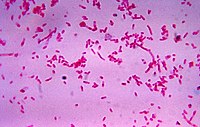
Photo from wikipedia
Abstract Background Lemierre’s syndrome is typically caused by Fusobacterium necrophorum where an oropharyngeal infection is followed by septic internal jugular vein thrombophlebitis with subsequent septic embolization. Yet, the pathogenesis of… Click to show full abstract
Abstract Background Lemierre’s syndrome is typically caused by Fusobacterium necrophorum where an oropharyngeal infection is followed by septic internal jugular vein thrombophlebitis with subsequent septic embolization. Yet, the pathogenesis of septic thrombophlebitis, differences dependent on the presence of jugular vein thrombosis, and the role of anticoagulant therapy are insufficiently understood. Methods Patients with invasive infection with F. necrophorum and Lemierre’s syndrome who had been investigated for jugular vein thrombosis were included from a previous population-based observational study in Sweden. Medical records were reviewed and compared in patients with and without jugular vein thrombosis. Then, patients with jugular vein thrombosis were compared by exposure to therapeutic, prophylactic, or no anticoagulation. Outcomes examined were thrombosis progression, early or late peripheral septic complications, chronic major sequelae, 30-day mortality, and major bleeding. Results Fifty-one of 82 (62%) radiologically investigated patients with Lemierre’s syndrome had jugular vein thrombosis. Patients with jugular vein thrombosis had lower platelet levels (median, 76 vs 112 ×109/L; P = .04) on presentation and more days to defervesence (12 vs 7 days; P = .03) yet similar rates of major sequelae and 30-day mortality. No significant differences in outcomes were seen between patients with jugular vein thrombosis exposed to therapeutic, prophylactic, or no anticoagulation therapy, yet study outcomes were rare. Conclusions Patients with Lemierre’s syndrome with jugular vein thrombosis were more severely affected, yet had similar prognosis. Most patients with jugular vein thrombosis recovered well without therapeutic anticoagulation therapy, though adverse events were similarly rare in anticoagulated patients. The observational design and rarity of study outcomes require cautious interpretation.
Journal Title: Open Forum Infectious Diseases
Year Published: 2021
Link to full text (if available)
Share on Social Media: Sign Up to like & get
recommendations!